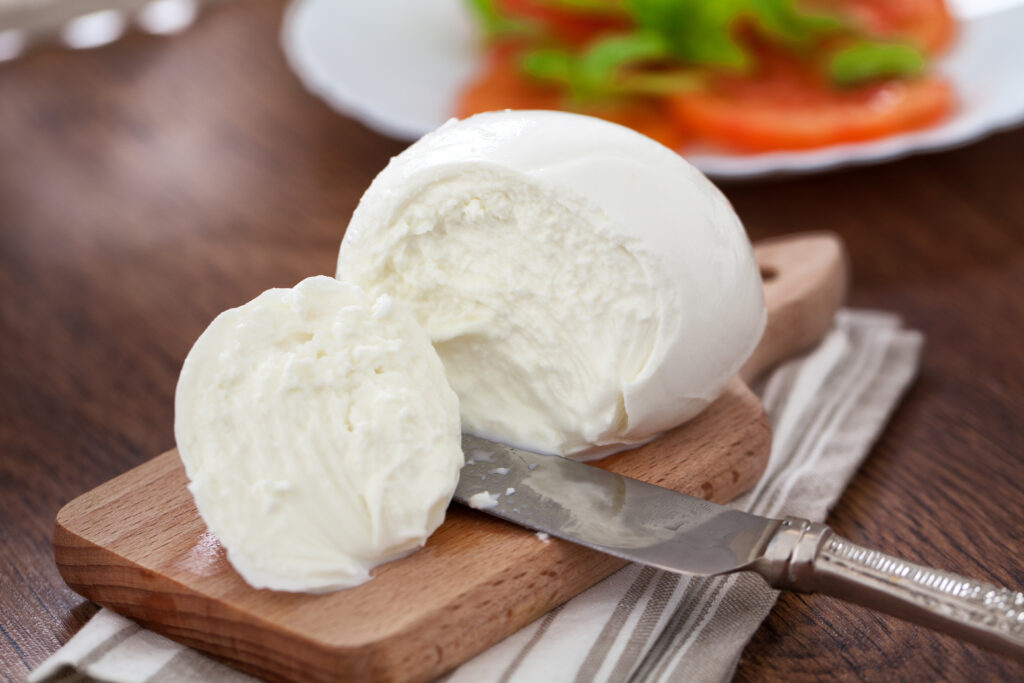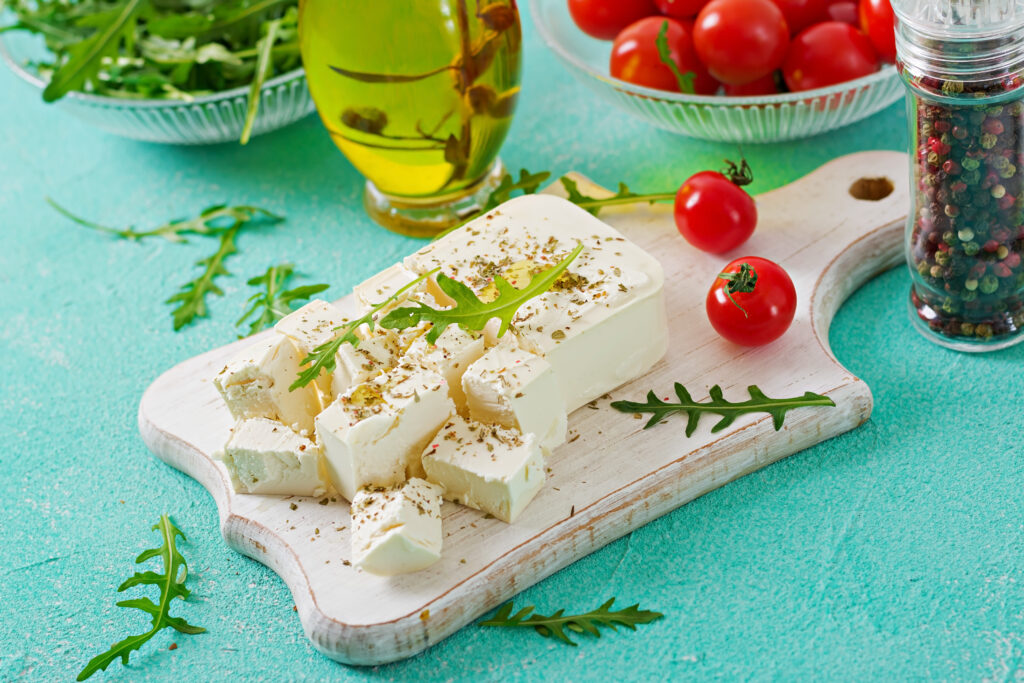Some of the links on this page are affiliate links, which means that Buzzy Kitchen earns commission from purchases made – at absolutely no extra cost to you. Thank you so much for supporting Buzzy Kitchen!
Cheese, cheese, cheese. I don’t know about you, but I just can’t get enough of the stuff. I always buy so much cheese that I never manage to eat it all in time, but can you freeze cheese? Do all cheeses freeze the same? And what happens after you freeze cheese, if anything at all?
Why don’t we dive right in and find out?
Can You Freeze Cheese?
Freezing cheese can change a number of things about it, including the texture, the taste, how it reacts to heat, and the quality. Freezing certain types of cheese can actually decrease the quality considerably.
You can freeze cheese, but certain types will behave better than others when defrosted.
There are also a few types of cheese it is not recommended to freeze.
Why Does Cheese Go Crumbly After Freezing?
Some cheese types go crumbly after freezing because of the way the ice crystals work within the cheese itself. Spaces or holes in the cheese allow for the growth of ice crystals, which then turns to liquid water when the cheese is removed from the freezer and left to thaw out.
Not only do the ice crystals change the shape of the cheese from the inside, but the ice contracts and dribbles out of the cheese as it defrosts. This cycle tends to leave behind cheese that is more crumbly and drier than it was before it was frozen.
Not all cheeses go crumbly after freezing, though. Some barely change at all when they are frozen and then thawed out. Others will change taste, texture, or appearance — or a combination of all three.
Can You Freeze Hard Cheese?
Some hard cheese types will freeze and defrost well.
Others, however, will turn super dry, very crumbly, and will fall apart when you defrost them. You might also find that they are much harder to slice up, which will make your morning cheese-on-toast rather difficult.
If you do intend to freeze hard cheese, cut it into smaller blocks. Larger blocks take longer to freeze, longer to defrost, and are more likely to undergo changes during the process. Smaller blocks freeze quicker, defrost quicker, and are less likely to change in terms of texture, taste, and meltability.
Can You Freeze Soft Cheese?
Some soft cheeses freeze well, but others do not.
It really does depend on the cheese. Sadly, there isn’t a one-size-fits-all answer to the question.
For example, low-moisture mozzarella cheese freezes pretty well. It does undergo some changes during the freezing-and-defrosting process, but on pizzas and in any other dishes, you likely wouldn’t know that the cheese was ever frozen at all.
Fresh mozzarella, on the other hand, does not freeze well at all. It turns watery when defrosted, if it has not been properly drained prior to freezing. Not only that, the cheese can turn very dry, rather hard, and quite crumbly — quite unlike typical mozzarella cheese.

You can read more about this in the following pages on Buzzy Kitchen:
Can You Freeze Blue Cheese?
It is not recommended to freeze blue cheese.
Although blue cheeses can be frozen, the freezing temperatures alter live cultures within the it. Those live cultures are vital for the growth of mould, which is what gives blue, veined and ‘mouldy’ cheese its name, taste, and appearance.
Freezing blue cheese or ripened cheeses can completely change the texture, taste, appearance, smell, and more. It completely alters the way the cheese matures, which could give you a completely different end result when it comes to thawing out and eating it or cooking with it.
Can You Freeze Cream Cheese?
Cream cheese can be frozen, but it will undergo some changes during the process.
When frozen and then defrosted, cream cheese has a habit of separating completely — the cheese curds (solid) separate from the whey (liquid). This happens during the defrosting part of the journey, so at first glance, freezing the cheese doesn’t look as though it has changed the structure of the dairy product at all.

Once frozen cream cheese has been defrosted, you will notice the separation. This does not mean the cheese is ruined, however; a little mixing with a whisk will re-combine the ingredients, reverse the separation process, and make the cream cheese suitable – and appealing – for consumption again.
What Cheese Can Be Frozen?
Some cheeses actually freeze quite well.
As previously mentioned, low-moisture mozzarella cheese freezes pretty well. Other soft cheeses behave well with freezing and defrosting too, including soft goat’s cheese.
Cream cheese can be frozen, but it will likely separate during the thawing-out process. You can whip or beat it a little to reverse the separation, but there will still be some difference to the texture and consistency.
Block-based cheeses are the best to cheese, especially semi-hard and hard block cheeses. This includes cheddar, gouda, Emmental, and parmesan cheese.
Not all semi-hard and hard cheeses are suitable for freezing, however. In all honesty, it’s a little bit of a minefield.
If you are searching the internet for “Can you freeze cheese?”, you are not going to get a very specific answer. You should search for the specific type or variety of cheese, such as mozzarella, feta, or Havarti.

Image by timolina on Freepik
What Cheese Can You Not Freeze?
Cheeses that have a very high moisture content, such as fresh mozzarella cheese, ricotta cheese, and cottage cheese, do not freeze well. The high water content will turn into solid ice, which expands. This can change the structure of the cheese, turning soft cheeses hard or creamy cheeses into crumbly ones.
Low fat versions of cheeses don’t always behave well during the freezing and defrosting process.
Camembert and brie are not suitable for freezing.
Blue cheeses are not particularly freezable, either. The mould is necessary to ripen the cheese and give it the colour, texture and taste that it is best known for. When you freeze the cheese, you are essentially putting pause on the mould, and you’re putting pause on the ripening process. This includes stilton, which is one of the most popular blue cheeses in the UK.
Some cheese types last for such a long time when kept in the refrigerator that it isn’t really worth attempting to freeze them. These include Romano and Parmesan, which are hard cheeses, usually grated over pasta dishes or similar.

You can freeze cheeses like Romano and Parmesan, but it’s hardly worth it. As with other cheese types, both Parmesan and Romano cheese go through changes in terms of consistency, taste, texture, meltability, etc when they are frozen.
When you consider that both Romano and Parmesan cheese store for up to a year in the fridge – without any changes to their taste, texture, meltability, etc – it’s better to keep them in the fridge rather than try and freeze them.
The same applies to Cornish Yarg cheese, too. These cheeses are best stored in cool temperatures, away from direct sunlight.
